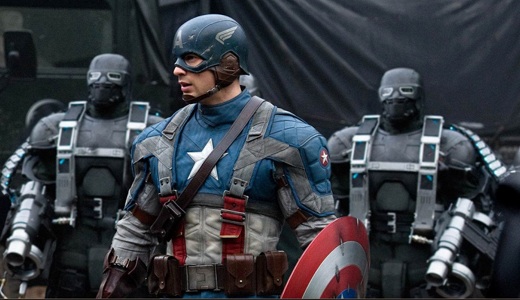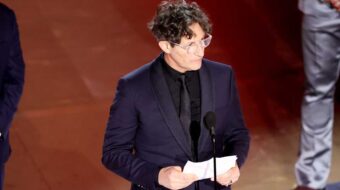
Movie Review
Captain America: The First Avenger
Directed by Joe Johnston
Starring Chris Evans, Hugo Weaving, Hayley Atwell, Tommy Lee Jones
2011, 124 minutes, PG-13
Captain America is a classic comic tale-turned-cinema, but in its shift from paper to big screen, a few things may have been lost in translation.
Set in the World War II era, the story revolves around Steve Rogers (Chris Evans), a thin, weak young man from Brooklyn who nevertheless has a sense of compassion and wants to serve his country. He agrees to be part of a military experiment to create a “super soldier” – the experiment is a success, and Rogers becomes the powerful Captain America.
As part of the war effort, Rogers is pitted against the Red Skull (Hugo Weaving), Adolf Hitler’s head of weaponry. Skull intends to use a tesseract energy source to destroy America.
Firstly, the tone of the film was a bit of an issue – but at the same time, one could appreciate it. Deliberately light-hearted and cheesy (in a very tongue-in-cheek sort of way), Captain America is a movie where you can just feel all the actors having a rollicking good time. The problem with this format, however, is that it seems to be one that does not best suit the story. Marvel wants to be faithful to the original stories, both in content and form, and they do an exceptional job at that. But the original stories took place in the 40s; this is 2011, and in a tale of super soldier versus grotesque Nazi occultist, a dark, gritty theme might have been more appropriate.
Moreover, at certain times, the film borders on self-parody, and that’s all fun and well, but ultimately not what the story needed.
Overall, it was highly entertaining. But when it was all said and done, it was predictable and brought nothing new to the table.
For those looking for positive political themes in an anti-Nazi film, one might be better off re-watching Inglorious Basterds.
Captain America however sidesteps pure Nazism and deals with alternate history, tackling instead the Hydra terrorist faction, which is really great, from a fantasy standpoint.
And yet, the movie could have offered some progressive statement – or at least gotten some real historical elements correct.
For example, America wasn’t the only country that played a key role in defeating the Nazis. The tale, with all its corny pro-America banter, never bothers to address this important fact. And yes, it’s Captain America, but a little variety never hurt. The filmmakers went out of their way to depict U.S. soldiers as a racially diverse bunch (which, by the way, wasn’t quite so during that time period), but disregarded heroes from other countries. It seems a bit contradictory.
The film’s strongest, most positive element revolved around the actors, who, as usual for Marvel films, were exceptional. Evans could have put a more emotional spin on his role, but he carried it with flying colors regardless. Weaving was the film’s best actor, his onscreen persona dripping with palpable grimness. Tommy Lee Jones was obviously great, though underused. But no one’s talent seemed more underused than newcomer Hayley Atwell, who played an officer with the Strategic Scientific Reserve, and love interest of our main hero. She injected some charming nuances into her character, and contributed to a growing series of beauty-with-brains roles in superhero films. She ought to have had more screen time.
When it all came down to it, it was the acting that truly carried this film and made it memorable, especially in light of a bland climax to a fight scene between hero and villain. Evans and Weaving did the best with what they were given, and thus, there’s reason for hope: Evans will reappear in The Avengers in 2012 (alongside Robert Downey Jr. and Chris Hemsworth), and will this time have a chance to put his talent into something with a better storyline.
Finally, the best aspect of the story (one that will actually leave viewers anticipating a sequel) is in its ending. After Rogers defeats Red Skull, he wakes up in New York, 70 years later. Enter a cameo appearance from Samuel L. Jackson, whose character tells Rogers, he “has work for him.” Unless you read the old comics, you probably wouldn’t have seen this “man out of time” element coming – but it seems like it has potential.
If anything, this film was fun and worth seeing, even if it lacked strong sociopolitical messages. And really, it was the final tale that needed to be told before next year’s epic Avengers, in which many heroes will cross over into one movie as part of a major story. One should hope it’s not overstuffed with pomp, and watered down with camp.
If the superhero genre is to survive the next decade, it deserves to carry the weight of social parallels, intelligent plots, and philosophical undertones. After all, that’s half the fun.
Photo: Screenshot from official website. Captain America (Chris Evans) faces down members of the Nazi terrorist faction called Hydra.












Comments